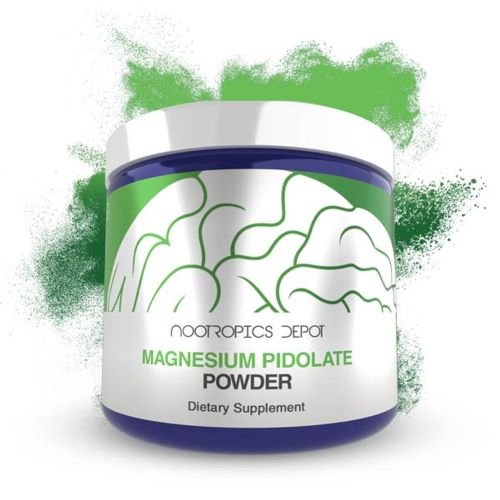The Hidden Power of Magnesium Pidolate: Benefits, Risks, and Why It Matters
Not all magnesium supplements are created equal; discover how magnesium pidolate's unique benefits and side effects set it apart from the rest.

What is | Benefits | Side Effects | Who Should Take | Bioavailability comparison | Where to buy | FAQ | Conclusion
Magnesium pidolate (MgP), a highly bioavailable supplement combining magnesium and pidolic acid. Pidolic acid is an organic compound involved in crucial biological processes, including metabolism and the production of proteins and enzymes. Research suggests it may offer health benefits such as enhancing energy levels and supporting brain function.
This potent pairing improves magnesium utilization in your body, supporting brain health and cognitive function while meeting your magnesium needs.
You can expect benefits like improved brain function, reduced stress and anxiety, and better sleep quality.
In this article you’ll uncover how it compares to other magnesium forms, who can benefit from it, and what to keep in mind when selecting a high-quality product.
KEY TAKEAWAYS
- Magnesium Pidolate is a combination of magnesium and pidolic acid, offering high absorption rates and enhanced magnesium utilization.
- The supplement improves brain function, reduces stress and anxiety, and supports heart health, bone strength, and muscle function.
- Potential side effects include gastrointestinal issues, headaches, muscle weakness, dizziness, and temporary stomach upset, such as bloating or gas.
- Magnesium Pidolate is recommended for individuals with magnesium deficiency, athletes, and those with high blood pressure, diabetes, or heart disease.
- It is essential to consult with a healthcare professional before starting supplementation, especially for individuals with serious kidney issues.
What is Magnesium Pidolate?
There are many types of magnesium supplements available, but one that stands out for being absorbed extremely well and offering potential health benefits is Magnesium Pidolate.
So, what makes Magnesium Pidolate special? Magnesium Pidolate is a chelated form of magnesium, meaning it is bound to the amino acid pidolic acid, also known as pyroglutamic acid. This combination helps the body absorb and use magnesium more effectively. [1]

Pyroglutamic acid is a naturally occurring substance in the human body. [2]
When magnesium is combined with pyroglutamic acid, it becomes easier for the body to absorb and can reach the brain more efficiently.
A 2016 study showed that magnesium deficiency is linked to many health issues like epilepsy and stress. The researchers found that magnesium pyroglutamate is particularly good for treating these conditions because it can reach nerve tissues more effectively. It helps protect the brain, lowers blood pressure, and reduces anxiety and depression. The study suggests using this form of magnesium for faster and more effective treatment, especially in neurological conditions.
This makes Magnesium Pidolate an interesting alternative for magnesium supplementation. As a relatively new type of magnesium supplement, Magnesium Pidolate is becoming more popular because of this high absorption rate.
Magnesium Pidolate Benefits
If you’re thinking about taking Magnesium Pidolate as a supplement, it’s important to know what benefits it can offer. This type of magnesium is easily absorbed by the body, which makes it very effective.
Here are some key benefits of including Magnesium Pidolate in your daily routine:
- Better brain function and stress relief: Magnesium Pidolate can help improve your brain function and reduce stress and anxiety.
- Heart health: Taking Magnesium Pidolate regularly can help keep your heart rhythm steady and support overall heart health.
- Stronger bones: Magnesium is important for strong bones, and Magnesium Pidolate is absorbed well by the body, making it good for bone health.
- Improved sleep: Magnesium can help you sleep better and reduce problems like insomnia.
- Better muscle function: Magnesium Pidolate helps your muscles work better, improving strength, endurance, and recovery after exercise.
Learn more about Magnsium’s benefits and what magnesium deficiency might cause.
Magnesium Pidolate Potential Side Effects
Taking Magnesium Pidolate as a supplement can help support your health, but it’s important to know about the possible side effects. While most people handle magnesium pidolate well, some might’ve unwanted reactions. Unwanted reaction are most possible to happen when buying powder form due to mis-calculating doses.
Common side effects of taking magnesium pidolate include:
- Stomach problems: diarrhea, nausea, and stomach cramps due to overdose.
- Headache: some people might get headaches when they start using magnesium pidolate
- Muscle weakness: taking too much magnesium can sometimes make your muscles feel weak
- Dizziness or feeling lightheaded: high doses of magnesium can cause dizziness or make you feel lightheaded
- Stomach upset: some people might get an upset stomach, including bloating or gas
These side effects are usually mild and temporary. If you notice any of these symptoms, you might want to lower your dose or talk to a doctor.
Who Should Take Magnesium Pidolate and Who Should Avoid It?
Magnesium pidolate can be a helpful supplement for some people, but it’s not for everyone. You might want to take magnesium pidolate if you have a magnesium deficiency, which a doctor can diagnose. It might also help you sleep better or feel less anxious.
Who Might Want to Take Magnesium Pidolate?
- Sports Players and Active People: If you exercise a lot or play sports, Magnesium Pidolate might help your muscles recover faster and work better.
- People Who Feel Worried or Stressed: If you often feel anxious or stressed out, taking magnesium might help you feel calmer and happier.
- People Who Don’t Get Enough Magnesium: If your doctor says you’re low on magnesium, or if you don’t eat many foods with magnesium, this supplement could help.
Who Should Stay Away from Magnesium Pidolate?
- People Taking Certain Medicines: Some medicines don’t mix well with magnesium. This includes: Osteoporosis drugs (like Fosamax), Some antibiotics (like Cipro), Water pills (diuretics), Stomach acid reducers (like Nexium). If you’re taking any of these, talk to your doctor before using magnesium supplements. You might need to take your medicine and the magnesium at different times, or your doctor might need to check your magnesium levels regularly. [3]
- People with Kidney Problems: If your kidneys don’t work well, you should avoid magnesium supplements. Your body might have trouble getting rid of extra magnesium.
- Pregnant or Breastfeeding Women: If you’re expecting a baby or breastfeeding, talk to your doctor before taking any new supplements, including Magnesium Pidolate.
How Magnesium Pidolate compares to other forms of Magnesium in terms of bioavailability?
Magnesium pidolate’s effectiveness depends on how well your body can absorb it, as well as your personal health needs. Bioavailability is a term that means how much of a nutrient your body can actually use, and it varies a lot between different types of magnesium.
This table highlights the bioavailability of various forms of magnesium, showing how Magnesium Pidolate compares to other common forms
| Form of Magnesium | Bioavailability (%) |
|---|---|
| Magnesium Pidolate | 40 – 60 |
| Magnesium Oxide | 4 – 10 |
| Magnesium Citrate | 20 – 40 |
| Magnesium Glycinate | 40 – 50 |
| Magnesium Malate | 20 – 30 |
| Magnesium Chloride | 50 – 60 |
| Magnesium Sulfate | Negligible* |
| Magnesium L-Threonate | – |
| Magnesium Glycerophosphate | 60 – 80 |
*Not for oral use. Absorbed through skin during baths.
Where to buy Magnesium Pidolate?
If you’re looking to add Magnesium Pidolate to your routine, it’s important to find a trustworthy place to buy it. You need to make sure the product is high quality, tested in labs, and verified for purity and identity.
One good option is Nootropics Depot, which sells 200g jars of Magnesium Pidolate. Each serving gives you 1650 mg of Magnesium Pidolate, making it a strong and effective supplement.

It also comes in capsule form for those who want to avoid the mixing hustle.

Nootropics Depot tests their Magnesium Pidolate thoroughly to make sure it’s pure and genuine. This quality control helps you trust that the product will work well and be safe to use.
As of now, a 200g jar costs and the 240 capsules bottles, sell at $44.99, which is a fair price compared to other options.
Frequently Asked Questions
Have more question? Just ask.
Bottom Line
Magnesium Pidolate is a highly bioavailable form of magnesium that offers several benefits, including improved muscle relaxation, better bone health, and enhanced energy production.
While side effects are typically mild, it’s crucial to consult a healthcare professional before starting any new supplement, particularly if you have existing medical conditions.
Have you tried Magnesium Pidolate, or do you have any questions or experiences you’d like to share? We’d love to hear from you!
More on Magnesium
